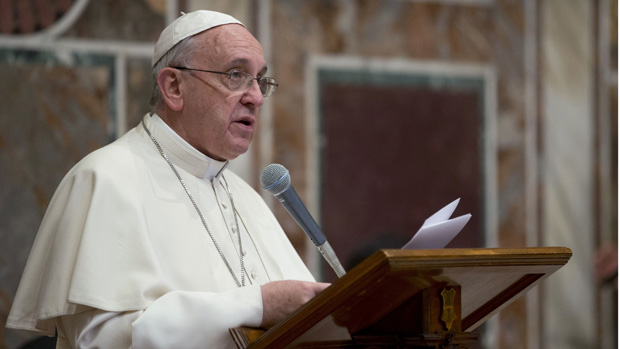Pope tells mafia: repent or go to hell
Francis launches the most outspoken attack by a pontiff

A free daily email with the biggest news stories of the day – and the best features from TheWeek.com
You are now subscribed
Your newsletter sign-up was successful
Pope Francis has launched an unprecedented attack on the mafia, warning them they will go to hell unless they change their ways.
Speaking at a meeting with relatives of those killed by the mafia, he warned organised crime leaders: "Blood-stained money, blood-stained power, you can't bring it with you to your next life. Repent.”
He added later: "I feel that I cannot conclude without saying a word to the protagonists who are absent today – the men and women Mafiosi. Please change your lives. Convert yourselves. Stop doing evil."
The Week
Escape your echo chamber. Get the facts behind the news, plus analysis from multiple perspectives.

Sign up for The Week's Free Newsletters
From our morning news briefing to a weekly Good News Newsletter, get the best of The Week delivered directly to your inbox.
From our morning news briefing to a weekly Good News Newsletter, get the best of The Week delivered directly to your inbox.
The meeting was the first time a pontiff has taken part in the annual commemoration day held by anti-mafia organisation Libera. Francis’s stance is a break from the past, when some of his 20th century predecessors were seen as reluctant to condemn mafia bosses.
The first explicit condemnation of the mafia came in 1993, when John Paull II warned gangsters that judgment day was coming and that they should “convert”. Two months after that statement two Roman churches were bombed.
Some priests in Italy who have stood up to the mafia have paid with their lives. Anti-mafia activists hope the pope’s statements will lead to a tougher stance from the Catholic Church.
Between them, Italy's leading crime groups – Sicily's Cosa Nostra, Calabria's 'Ndrangheta, and the Camorra from around the southern city of Naples – have a joint annual turnover of €116bn (£97bn), according to the United Nations.
A free daily email with the biggest news stories of the day – and the best features from TheWeek.com
-
 Samurai: a ‘blockbuster’ display of Japanese heritage
Samurai: a ‘blockbuster’ display of Japanese heritageThe Week Recommends British Museum show offers a ‘scintillating journey’ through ‘a world of gore, power and artistic beauty’
-
 BMW iX3: a ‘revolution’ for the German car brand
BMW iX3: a ‘revolution’ for the German car brandThe Week Recommends The electric SUV promises a ‘great balance between ride comfort and driving fun’
-
 Munich Security Conference: a showdown between Europe and Trump?
Munich Security Conference: a showdown between Europe and Trump?Today’s Big Question Report suggests European leaders believe they can no longer rely on the US for military support – but decoupling is easier said than done
-
 Epstein files topple law CEO, roil UK government
Epstein files topple law CEO, roil UK governmentSpeed Read Peter Mandelson, Britain’s former ambassador to the US, is caught up in the scandal
-
 Iran and US prepare to meet after skirmishes
Iran and US prepare to meet after skirmishesSpeed Read The incident comes amid heightened tensions in the Middle East
-
 Israel retrieves final hostage’s body from Gaza
Israel retrieves final hostage’s body from GazaSpeed Read The 24-year-old police officer was killed during the initial Hamas attack
-
 China’s Xi targets top general in growing purge
China’s Xi targets top general in growing purgeSpeed Read Zhang Youxia is being investigated over ‘grave violations’ of the law
-
 Panama and Canada are negotiating over a crucial copper mine
Panama and Canada are negotiating over a crucial copper mineIn the Spotlight Panama is set to make a final decision on the mine this summer
-
 Why Greenland’s natural resources are nearly impossible to mine
Why Greenland’s natural resources are nearly impossible to mineThe Explainer The country’s natural landscape makes the task extremely difficult
-
 Iran cuts internet as protests escalate
Iran cuts internet as protests escalateSpeed Reada Government buildings across the country have been set on fire
-
 US nabs ‘shadow’ tanker claimed by Russia
US nabs ‘shadow’ tanker claimed by RussiaSpeed Read The ship was one of two vessels seized by the US military